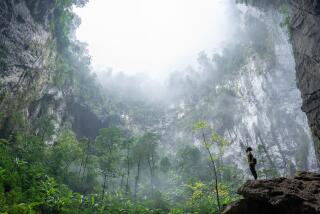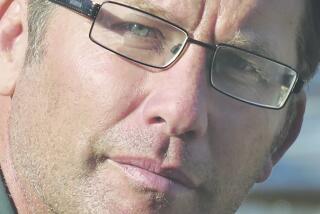Attenborough: Apostle of Conservancy
He says he has the greatest job in the world.
âItâs true. Itâs true,â Sir David Attenborough says emphatically in his British accent.
Attenboroughâs energy following a non-stop flight from London to Los Angeles is proof positive how much he enjoys his work.
Two weeks ago, the 61-year-old naturalist and author was in Germany, beginning production on his next TV nature series. The night before he arrived in Los Angeles, he had been in Wales, launching the Welsh Wildlife Appeal with a lecture about conservation.
It is traveling to places all over the world that prompts Attenborough to give himself the âgreatest jobâ title--that and his enduring fascination with what he finds on his travels, which make up the subjects for his many nature series on television.
His current promotional tour, a three-week mission that will take him across the United States and into Canada, is for his latest program, âThe First Eden,â a four-part historical look at the Mediterranean. (The show debuts Monday and will air on consecutive Mondays, at 8 p.m. on Channels 15 and 28, and 9 p.m. on Channels 24 and 50.)
âI think this one (tour) is more of a necessity than previous ones because the last two series (âThe Living Planetâ and âLife on Earthâ) were 12- and 13-parters, so word of mouth got around,â Attenborough said, relaxing in his hotel suite. âAssuming the show is any good, people would say, âDid you see that show?â Then another person would say, âOh yeah, and itâs on again next week.â
âThis show (âFirst Edenâ), however, is only a four-parter, so if theyâre going to see it, theyâve got to see it from the beginning.â
Divided into one-hour chapters, âThe First Edenâ begins at the lowest lake in the world, the Dead Sea, where writer/narrator Attenborough explores the creation of the Mediterranean Basin and the arrival of plants and animals to the area. He traces the areaâs history through recent efforts to revive its damaged land and sea.
âWith every stage of manâs relationship and attitude to the natural world that you can find anywhere in the world today--whether itâs knocking down rain forests in Brazil, poisoning Lake Erie, or any stage in between--you can find that the Mediterranean went through that stage,â Attenborough said.
âItâs also a place where a lot of us in Europe, as well as a lot of Americans, spend holidays, so people can see it for themselves. The relationship between man and the natural world is very visible there, very closely served.â
The show had its inception about two years ago, when Attenborough started what would culminate in six months of research. After completing his initial research--âItâs not that you know everything, itâs that you know where to find information,â Attenborough said--the former program director for the British Broadcasting Corp. wrote a script and had it checked by a variety of professors. (Additional material went into his book, also called âThe First Eden.â)
Attenborough said his rewrites of the TV script continued throughout production.
âWhen you get to a location, you realize that this paragraph shouldnât be here and this information is needed earlier and so on,â Attenborough said, emphasizing his points by shifting back and forth in his seat. âWhat weâre trying to do is tell a developing story with a beginning, middle and end.
âIf youâre not careful, you lose sight of the shape of the program. You shouldnât have a narrator who is making five or six appearances in the first third of the program and none in the rest. There should be a purpose as to why the narrator is there and why the people are looking at you and not the animal. You canât just arrive and mince on.â
The series, like his others, was developed for and produced by the BCC in England, which then sold it for airing in the United States on PBS. âThe First Edenâ is being underwritten here by IBM, which also has commissioned classroom materials to be distributed to more than 100,000 educators throughout the nation.
âIâm very flattered when schools want to show the programs to their students,â said Attenborough, who studied zoology and botany at Cambridge University. âIâm not making them for schools, Iâm making them for people, and if itâs then thought that there is something in there solid and worthwhile by educators, Iâm all the more pleased.â
In viewing âThe First Eden,â students and others will see Attenborough sitting on a cliff in Africa and discovering fruit bats in a cave in Cyprus. He said that he has never been injured in any of his televised adventures.
âIâm far too cautious,â he said. âIf I were to come back from a trip with a bag of broken glass and jingling cog wheels, and tell my employers that I was charged by an elephant and it crushed the camera to a pulp and I just escaped by swinging on a branch, they wouldnât say, âWell done, you loyal, brave person.â Theyâd say, âYou bloody fool, donât you realize that camera was invaluable!â
When asked how much longer he sees himself exploring the environments of the world, Attenborough immediately begins discussing his two current projects. His next series will be a four-part journey into the world of fossils, and heâs writing a 12-part series on animal behavior.
âIâm always anxious to begin the next,â he said.
More to Read
Sign up for The Wild
Weâll help you find the best places to hike, bike and run, as well as the perfect silent spots for meditation and yoga.
You may occasionally receive promotional content from the Los Angeles Times.






